By Sarah Weld
Berkeley Law’s robust Clinical Program recently welcomed 14 new hires — 13 supervising attorneys and one teaching fellow. The influx of new, diverse teaching staff will help extend the growing program’s representation of marginalized communities and expand the range of real-world experience in direct services, litigation, counseling, policy advocacy, and research offered to more than 300 students each year. More hires are expected in the near future as the 14-clinic program plans to add three more in-house clinics and four clinical faculty members over the next four years.
Environmental Law Clinic
Nazune Menka, supervising attorney
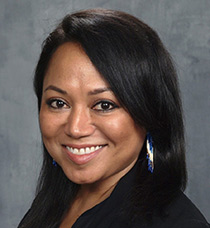
Menka moved to the clinic this fall after serving as the law school’s Tribal Cultural Resources Project Policy Fellow for two years. Born and raised in Alaska, Menka is Denaakk’e (Koyukon Athabaskan) and Lumbee. Before law school, she earned a master’s in Environmental Chemistry at the University of Arizona, where she researched the bioaccessibility of arsenic and lead in soil from abandoned mining sites. She has also worked on policy issues at the Alaska and Hawaii state legislatures, the U.S. Department of Energy, and the Environmental Protection Agency.
“I enjoyed serving Native Nations and working with law students during my fellowship and am excited to continue serving our California communities in the clinical setting,” says Menka, who holds a J.D. from the University of Arizona with a certificate in Indigenous Peoples Law & Policy. “With the clinic, I am able to work in areas I’ve always been passionate about — the environment, education, law and policy, and Tribal sovereignty.”
New Business Community Law Clinic
Mariana Acevedo Nuevo LL.M.’19, supervising attorney
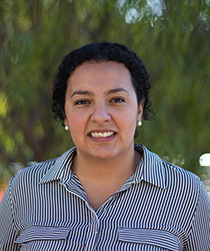
Acevedo Nuevo returns to the clinic, where she was a student, after working as the Shriver Housing Attorney at Legal Access Alameda advocating for housing rights for low-income residents in Alameda County. Before moving to the United States, Acevedo Nuevo represented clients before the Mexican Economic Competition Commission, including Latin America’s leading e-commerce technology company and one of Mexico’s five busiest container ports.
“As a clinic student, I realized how impactful our work was: We help people kickstart their companies and give them tools to realize their dreams and make a living,” says Acevedo Nuevo, who worked in the Federal Economic Competition Commission’s market investigations unit after completing her LL.B. at the Instituto Tecnologico de Mexico. “The clinic changed my career trajectory. Working with small businesses helped me find meaning while practicing business law.”
Samuelson Law, Technology & Public Policy Clinic
Areeba Jibril, teaching fellow
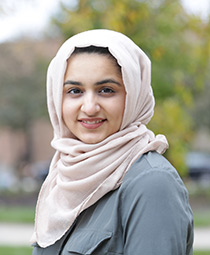
Jibril worked as a Fisher-Paradise Fellow with the ACLU of Massachusetts, where she litigated police and prison official misconduct issues. Before, she worked at a San Francisco law firm and interned at Harvard Law School’s Cyberlaw Clinic and the Digital Rights Foundation in Pakistan. She graduated from the University of Michigan Law School, and was a student attorney with the Michigan Innocence Clinic and a Geneva International Fellow at the United Nations Office of the High Commissioner for Human Rights.
“I want to continue to advocate for marginalized communities, while also helping students develop their legal skills in an area of law that is constantly evolving and has a far-reaching impact,” Jibril says. “Clinic played a crucial role in preparing me for practice, and I want to make sure the students I work with feel the same way.”
Brianna L. Schofield ’12, supervising attorney
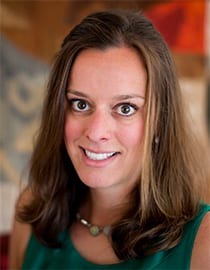
Schofield, a former clinic teaching and research fellow, returns after serving as the executive director of Authors Alliance, advocating for the interests of authors wanting to make their works broadly available to serve the public good. She was also a special deputy attorney general at the California Department of Justice. Her work promotes balanced laws and policies that encourage access to knowledge and culture, with particular attention to the challenges and opportunities presented by new technologies.
“I am thrilled to return to Berkeley Law and the clinic, in no small part because of the opportunity to work alongside the phenomenal Clinical Program faculty, staff, and students who are relentless in their efforts to promote justice,” she says. “There’s no better place to combine my passion for mentoring law students with my dedication to representing clients in their pursuit of public-minded technology law and policy.”
East Bay Community Law Center
Laura Bixby, supervising attorney, EBCLC Housing Clinic
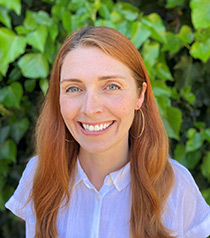
Bixby joins EBCLC after working as a public defender in the Special Litigation Unit at Orleans Public Defenders in New Orleans. She developed a strategy to challenge New Orleans’ network of real-time-monitored surveillance cameras and served as the named plaintiff in a public records lawsuit brought by the ACLU and Southern Poverty Law Center. Bixby also successfully argued a case at the Louisiana Supreme Court that struck down a law criminalizing selling art outdoors as violating the First Amendment.
“It is no surprise to anyone that we have a housing crisis in California and I felt this was an area of law where my services were really needed,” says Bixby, who worked at the Federal Defenders of Arizona and the Southern Center for Human Rights in Atlanta during law school. “I did Community Law Clinic at Stanford Law and had a wonderful experience doing disability benefits work, eviction defense, and record expungement. I gained a much better understanding of how this country’s legal system treats people living in poverty.”
Karla Cruz, supervising attorney, EBCLC Immigration Clinic
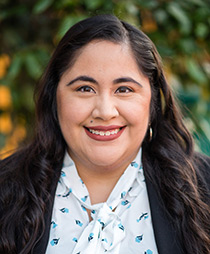
Cruz interned with the same clinic during law school, working primarily on the cases of unaccompanied minors from Central America. She also interned with the Immigrant Legal Resource Center and McGeorge School of Law’s Immigration Clinic before working as a staff attorney at Centro Legal de La Raza providing direct legal services to Spanish-speaking immigrants.
“As a first-generation college graduate and lawyer, it helped me to find mentors who supported me in my professional aspirations. I hope to do the same for other students,” Cruz says. “In law school, I worked on removal proceedings cases and visited detention centers and gave legal consultations. This experience opened my eyes to the horrendous conditions detained immigrants experience and the legal uphill battle they face in seeking legal representation.”
Ellen Ivens-Duran ’21, supervising attorney, EBCLC Youth Defender Clinic
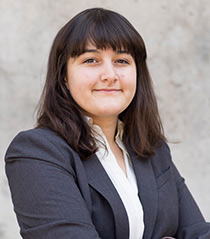
Ivens-Duran is dedicated to serving East Bay communities seeking to reimagine the juvenile legal system. As a law student, she participated in EBCLC’s Education Defense & Justice for Youth and Health & Welfare clinics and served as a student member on EBCLC’s board. After graduation, she clerked for Judge Corinne Beckwith on the District of Columbia Court of Appeals.
“I look forward to working with young people to keep punitive systems from pulling them in and schools from pushing them out,” Ivens-Duran says. “I had the privilege of being in three Berkeley Law clinics — the Death Penalty Clinic and two at EBCLC. As a clinical student, I worked with and for clients, and also deepened my understanding of the limits of legal advocacy. I’m excited to do direct services work on behalf of clients and be more involved in policy work as a staff attorney.”
Daisy Ocampo Felt, supervising attorney, EBCLC Immigration Law Clinic
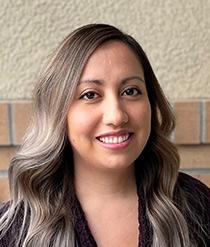
Felt worked as a staff attorney for UC Davis School of Law’s Immigration Law Clinic, representing immigrant children who were Flores Settlement Agreement and Lucas R. class members, challenging the conditions under which children were detained and asserting their due process rights. The daughter of Mexican immigrants, she argued before the U.S. Ninth Circuit Court of Appeals on behalf of a legal permanent resident erroneously deported. Felt also worked at Community Legal Aid SoCal and Neighborhood Legal Services of Los Angeles County.
“Navigating the legal systems in place is difficult to do for most people. We do our job when we help those disenfranchised by our systems access those systems and navigate them successfully, or break them down to provide real protections to those who need it the most,” Felt says. Calling her clinic experience as a student the “best and most practical experience I had in law school,” she says, “Since then, my 10-year plan has been to become a clinical professor or supervisor.”
Shahrzad (Shazzy) Kamali ’21, supervising attorney, EBCLC Clean Slate Clinic
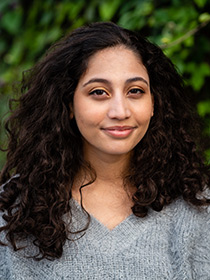
Kamali, a Brian Lewinstein Youth Justice Fellow, focuses on the decriminalization of poverty and driving-related issues, including traffic and parking tickets, tolls, municipal debt, and criminal legal debt. Before joining EBCLC, she worked as an intern in Santa Clara County’s Office of the Public Defender, a Juvenile Justice Reform Fellow for Berkeley Law’s Policy Advocacy Clinic, and a law clerk in Legal Aid at Work’s Work & Family Division.
“My clinic experience was invaluable to developing my confidence as a legal advocate. During my 1L summer, I participated in the Policy Advocacy Clinic and liked my experience so much I continued participating every semester until I graduated,” Kamali says. “Working in the Decriminalization of Poverty sub-unit of EBCLC was a natural continuation of the work on fines and fees I was already doing. I was particularly interested in exploring and learning more about driving-related fines and fees.”
Brigitte Nicoletti ’20, supervising attorney, EBCLC Clean Slate Clinic
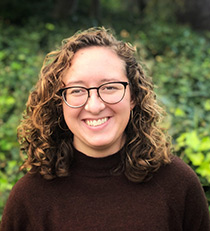
Nicoletti has focused on addressing the numerous social and economic harms associated with mass incarceration since law school. She was a clinical student in the Clean Slate Clinic for three semesters, and also had internships with the Youth Law Center, the Public Defender Service in Washington, D.C., and Disability Rights California. Prior to EBCLC, she worked as a post-bar fellow with the Juvenile Defender Unit at Contra Costa County Public Defender’s Office.
“My time with the Clean Slate Clinic in law school was the most meaningful part of my experience as a law student,” Nicoletti says. “I had felt very disconnected from the law school experience, and getting to work with incredible clients and attorneys reminded me why I came to law school in the first place. I learned so much about what it means to be a good advocate during my time with the clinic.”
Abigail Rich, supervising attorney, EBCLC Immigration Clinic
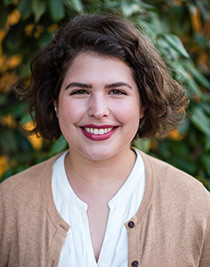
Rich has worked as a staff attorney at East Bay Sanctuary Covenant, where she helped clients obtain immigration relief including asylum, green cards, and Special Immigrant Juvenile Status. She began her legal career as a Liman Fellow with a project focused on the intersection of legal services and mental healthcare for immigrant survivors of trauma. During law school, she interned with the Greater Boston Legal Services Immigration Unit and GLBTQ Legal Advocates & Defenders.
“Clinical education prepared me to become a public interest lawyer, and I feel passionate about providing the same kind of training and mentorship to current law students,” says Rich, who participated in the Worker and Immigrant Rights Advocacy Clinic, Immigration Legal Services Clinic, Landlord-Tenant Clinic, and International Refugee Assistance Project at Yale Law School. “I look forward to continuing to help students learn to advocate for our noncitizen clients navigating this country’s deeply unjust immigration system.”
Michael Trujillo, supervising attorney, EBCLC Community Economic Justice Clinic
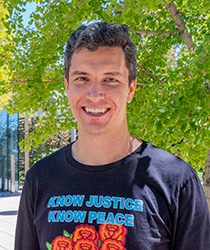
Trujillo has represented low-income tenants in eviction cases, supported activists in forming the South Bay’s first community land trust, and brought affirmative lawsuits to enforce fair housing and civil rights laws at the Law Foundation of Silicon Valley in San Jose. At Harvard Law School, he represented low-income tenants in the Housing Clinic and served small businesses and nonprofits in the Community Enterprise Project.
“I am excited to connect students to local leaders who are envisioning and implementing alternatives to extractive legal and economic systems to further racial, economic, and housing justice,” says Trujillo, who worked to advance voting rights and enforce civil rights laws through clerkships at several places, including the ACLU of Massachusetts and the Brennan Center for Justice. “EBCLC and the clinic have built strong relationships with community members and partner organizations to advance ground-breaking legal structures, policies, and programs that center people’s basic needs over corporate profits.”
Atasi Uppal, supervising attorney, EBCLC Education Justice Clinic; director, Education Defense and Justice for Youth
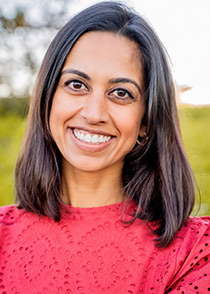
Uppal was drawn to EBCLC because of its commitment to providing legal services and policy advocacy deeply connected to the community’s needs and demands. Before joining EBCLC, she worked at the National Center for Youth Law, taking part in class action litigation and policy reform on behalf of students of color and young people in the juvenile justice system. Uppal started her career as a public defender representing parents and children in child welfare and status offense proceedings.
“Our public education system is so entangled with the juvenile legal system; society treats students of color with suspicion, rather than support. Challenging the criminalization of students and advocating for their educational rights is a tool against racial oppression and a step toward decarcerating youth,” Uppal says. “Our clinic and EBCLC are challenging traditional forms of public service lawyering by providing holistic legal and social work services that emphasize the humanity and strengths of our clients.”
Sophia Wang, supervising attorney, EBCLC Consumer Justice Clinic
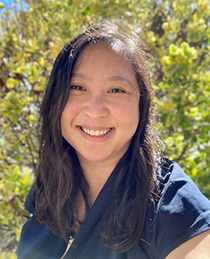
Wang was a staff attorney at Bay Area Legal Aid, where she provided holistic legal services to formerly incarcerated women and veterans experiencing housing instability. Her practice has included eviction defense, public benefits, disability rights, municipal debt, court fines and fees, veterans benefits, military discharge upgrades, and medical-legal partnerships.
“I look forward to joining a team of advocates who are passionate about protecting low-income consumers from predatory and oppressive financial systems,” says Wang, who participated in several clinics at Yale Law School, including the Immigration Legal Services and Native Peacemaking clinics, and the Asylum Seekers Advocacy Project. “I was drawn to the Consumer Justice Clinic because its work covers such a wide breadth of issues and reaches nearly every aspect of how we obtain, spend, and borrow money in our day-to-day lives.”